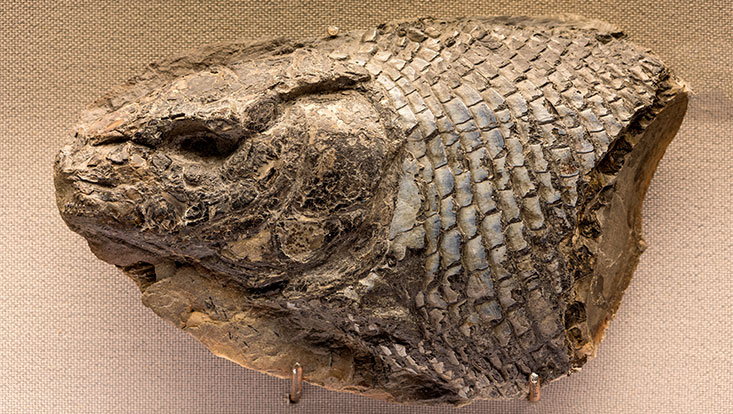
Treasure of the month September: A 175 million year old fish head
1 September 2017

Photo: UHH, RRZ/MCC, Mentz
Found at the gates of Hamburg: Fossilized "Ganoidschupper" from the Lower Jurassic.
The treasure of the month September is a fossilized fish (genus Lepidotes) from the LIB Paleontological Collection. It can be seen in the Museum of Nature - Geology. Fish like Lepidotes (sometimes spelled "Lepidotus") were heavily armored and are also called "ganoid scalers" because of their thick scales.
Our treasure of the month is about 175 million years old and comes from the Lower Jurassic. At that time there was a shallow sea where the Baltic Sea is today, and there our Lepidotes probably swam around during his lifetime. However, the piece was found only scarcely 25 km far away from Hamburg near Ahrensburg, and there should not be actually so old deposits at the surface. How is it possible to find rocks over 100 million years old in northern Germany, although most sedimentary deposits here are much younger?
The solution to the riddle is glaciers. During past ice ages, for example during the Vistula Ice Age about 100,000 years ago, glaciers repeatedly extended from Scandinavia into Germany, transporting ancient sediments southward. After the ice melted, the deposits were left behind. LIB owns a particularly large collection of these so-called glacial boulders. The pieces they contain, for example the lepidotes, are currently being digitally recorded in cooperation with the Archiv für Geschiebekunde.
For queries
Dr. Ulrich Kotthoff
LIB
Head of the Museum of Nature - Zoology
Tel.: +49 40 42838-5009
E-Mail: Ulrich.Kotthoff"AT"uni-hamburg.de
